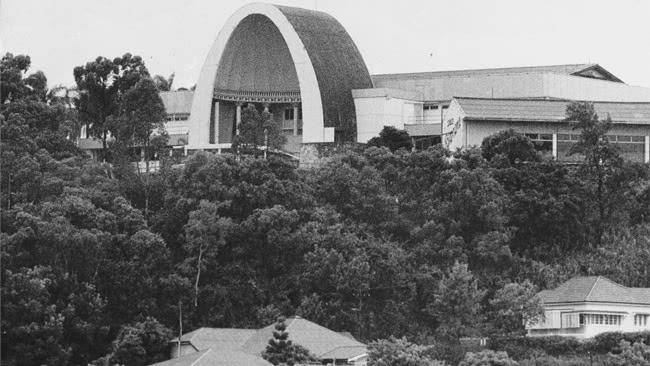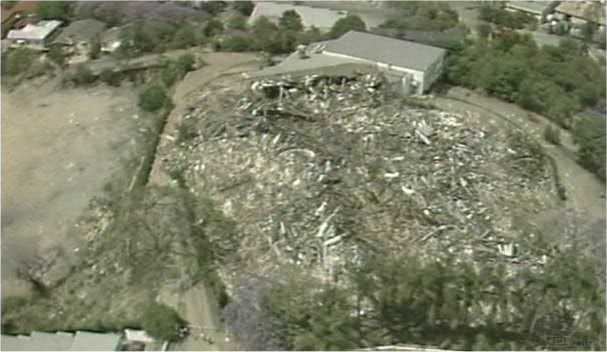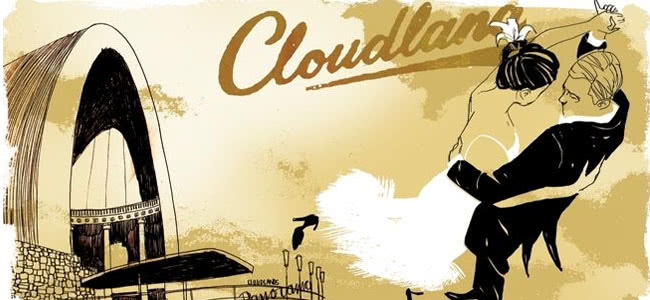Today marks 30 years since one of Brisbane’s most historical and dearly loved establishments was demolished overnight.
As the Brisbane Times reports, Cloudland, which was originally going to be Brisbane’s very own Luna Park before being commandeered by US General Douglas MacArthur, was a truly iconic live music venue and became one of the best in Australia after hosting a number of highly sought after concerts.
At 4am on November 7, 1982, the Deen Brothers took to the site at the request of the Bjelke-Petersen government and by lunchtime, Cloudland Dance Hall was a pile of rubble.
Despite it being listed with the National Trust, Cloudland was simply not protected and it wasn’t until a decade after the heartbreaking demolishing of 1992 that Queensland received its first Heritage Register.
It has since been immortalised in Brisbane’s Fortitude Valley when an expansive restaurant and bar by the same name opened in 2009 – even holding extremely popular ‘Soulsa’ dance nights.
Peter Garrett, former frontman of Midnight Oil and now the federal government minister for school education, also commemorated the venue 5 years later in the song “Dreamworld” (from the 1987 album Diesel And Dust), which features the lines: “Cloudland into dreamland turns/The sun comes up and we all learn/Those wheels must turn.”

Garrett recalls the first time he and his band played at the original venue to the Brisbane Times: “We had seen it on top of the hill, we had heard about it, but nothing prepared us for that first impression of getting in to this amazing building and just saying, ‘wow’.”
“It was very different to where we had been playing before and it had so much atmosphere and it was such a fantastic building to play in,” he said.
It was also just so happened to be a great place to go and see bands.
The Clash once played London Calling in full, and Echo and Bunnymen proved their position as one of the most influential bands of their time playing there. Madness brought their Camden ska to the domed, chandelier-draped ceiling, The Cure huffed their way around at the height of the 70s, while Ian Drury and the Blockheads hit the crowds with their rhythm stick.
The big three Australian bands – Midnight Oil, Cold Chisel, and The Angels – all headlined there at least once, and before this, the old time favourites such as Jerry Lee Lewis, Johnny O’Keefe played there, as did the Bee Gees.
Cloudland also famously hosted three of the six concerts performed by rock ‘n’ roll legend Buddy Holly on his only Australian tour in February 1958, that legacy came crumbling down with the bricks and mortar thirty years ago to the day.

The 30th anniversary of the demolished Cloudland falls in a very tenuous year for Australian live music venues, and especially those in neighbouring Brisbane.
Another highly iconic Brisbane site, The Tivoli, was listed for sale earlier this year, and the current owners, The O’Rourke family, hope to sell the venue to someone who would carry on the legacy as an iconic music venue.
“I can’t see it being anything besides [a live venue],” said Tivoli managing director John O’Rourke at the time. “So I can’t see that being changed. I’d be surprised if it was.”
Its space holds a potential crowd of 1,500 standing or 700 seated, and stands as one of the few 1,000+ capacity venues still operating in Brisbane. If the Tivoli no longer operates as a music venue, it will fall to the likes of The Zoo and The Hi Fi, with their larger rooms and accessible locations, to uphold the city’s live music community.
Despite the Tivoli’s humble beginnings as a bakery in 1917, it does not feature on the state heritage register. This is one aspect of the current system which Environment and Heritage Minister Andrew Powell wants to potentially update.“It had so much atmosphere and it was such a fantastic building to play in,” – Peter Garrett
“We know there are a number of passionate people in the community who value the role of the Queensland Heritage Council and the work it does,” Mr Powell said. “For this reason, I called for expressions of interest earlier this year from people who may be interested in being members of the Heritage Council who may not have been involved before.”
Mr Powell said these changes would be in place by next month, “the process to refresh the membership of the Queensland Heritage Council is under way and should be concluded by mid-December.”
Unfortunately there are no current plans to review the 1992 Queensland Heritage Act, but Powell says he is “always happy” to take advice from the Council on the ways in which the current Act is administered or enforced.
Similar to the Regent Theatre in Brisbane’s CBD being gutted to make room for apartments but retaining its heritage-protected exterior, Melbourne’s Palace Theatre has been bought after its notice for sale, but no confirmation on its future has yet been released. Despite shows being booked into early 2013 for the 2,000 capacity favourite in Melbourne’s CBD.
However, there’s no room for change if people like Powell aren’t looking at the core of such depressing business transactions: the actual Act itself. It seems after three decades, state governments aren’t learning from their mistakes by giving any input to the purchasing of historical live venues.

































